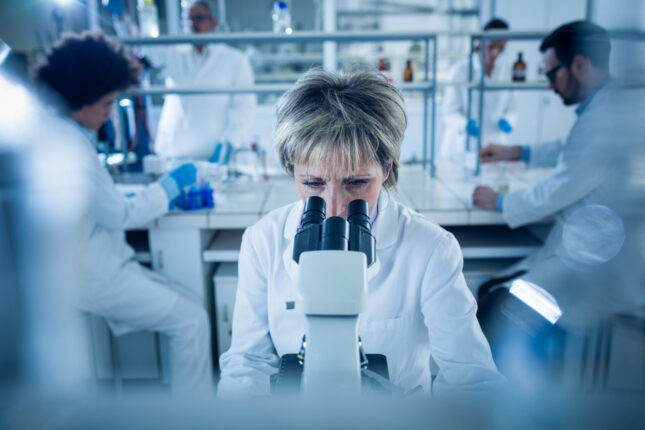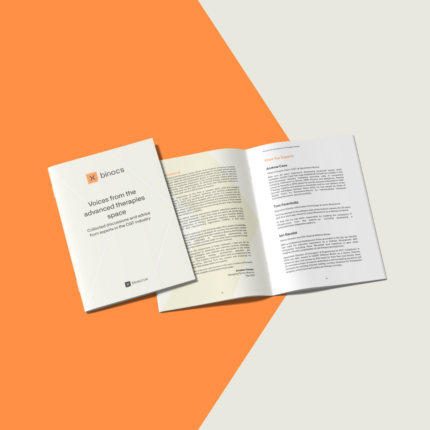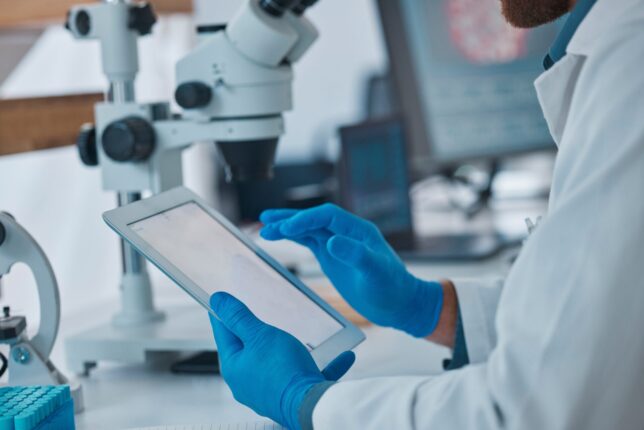
CAR-TCR 2022: key take aways
From September 19th to 22nd, members of the Binocs team attended CAR-TCR 2022 Summit in Boston, MA. Binocs was present as an exhibitor and attended talks from across the 8 topic tracks alongside approximately 1,000 other in-person attendees from across the industry, including several existing Binocs clients.
The CAR-TCR Summit is one of the world’s largest and most comprehensive conferences centered on the cell and gene therapies (CGT) industry. It included presentations and discussions divided into 8 different tracks, covering the entire range of responsibilities and interests, from Discovery through to Market Access. Many of the attendees were scientific subject matter experts and engineers, who joined to learn about the exciting new breakthroughs in technology and methodology that were being reported. When we weren’t staffing the Binocs booth, my colleague, Akshay Peer, and myself found the talks with the most relevance to our work with Binocs to be in the Manufacturing and Logistics tracks.
Did you know that Bluecrux has published an eBook about the CGT industry?
Introducing
Voices from the Advanced Therapies Space: collected discussions and advice from experts in the CGT industry
A unique deep dive into the challenges of the cell and gene therapy sector, from the perspective of established experts in the field, in their own words
Download your FREE copy today!As I described in a recent article, the CGT sector is suffering from significant capacity issues, especially when trying to meet the demand for CAR-T cell cancer treatments. In this context, one trend at the event that we found especially interesting was the topic of manufacturing scalability, with several speakers highlighting the urgent need for advances in technologies that are end-to-end automated and flexible. In particular, representatives from contract development and manufacturing organizations (CDMOs) were interested in the potential for new closed system devices that allow full automation of the production process, from receipt of the source material through to expansion and refinement of the final product. The great benefits of increased automation at this stage in the treatment cycle were clearly defined as increased speed and reduced variability, both critical to improving treatment rates.
A similar capacity issue was also reported as representing a significant bottleneck for in-house apheresis at autologous CAR-T treatment centers. Issues such as increased demand, limited physical space, competition from non-CGT apheresis requirements, and supply chain continuity were highlighted as placing particular pressure on limited resources. By contrast, however, a talk by the American Red Cross noted that, as an apheresis outsourcing option, they consistently have more than 500 unfilled slots each month. This surplus of capacity was presenting as being due to the ARC’s nationally centralized methodology, with streamlined consistency distributed across sites in all 50 states making it a logical candidate for subcontracted source material collection. This suggests that, by exploring a new model for outpatient apheresis, cell collection needn’t represent a treatment bottleneck. Indeed, apheresis availability should be able to exceed manufacturing capacity long after new automation technologies have been implemented.
As the market leader in digital scheduling and capacity management solutions for the CGT industry, we’re interested in supporting both the long term planning of therapy developers as they scale from discovery to trialing and commercialization, and in providing day-to-day time management for busy CDMOs juggling multiple therapies at different stages of development and manufacturing. We spoke at length with both stakeholder groups and were also able to demonstrate our engineering slot-picker system to treatment center representatives. This allows medical centers to book an apheresis appointment for a patient, safe in the knowledge that the necessary capacity has been reserved at a participating manufacturing site.
We look forward to attending next year’s event to explore how the reported advancements have progressed through implementation and to review how Binocs can collaborate further in helping to streamline processes to increase access to CAR and TCR therapies.
If you are interested in discussing a demo of the Binocs system for your CGT requirements, get in touch with us today!
More about cell and gene therapies
-
Learn about the therapies that promise to save the lives of countless cancer patients worldwideRead more
-
Bluecrux publishes its first CGT eBook, putting professionals in the spotlight!
Bluecrux announces the publication of its first CGT eBook, titled “Voices from the Advanced Therapies Space: collected discussions and advice from experts in the CGT industry”Read more -
4 ways the cell & gene therapy industry is turning challenges into opportunities
Because the cell and gene therapy (CGT) industry is still so relatively young, it is an emergent sector in which companies are constantly innovating to find new solutions to…Read more
Stefanie Leysen
With a background in computer science engineering and 5 years consulting on IT strategy projects for Deloitte, Stefanie is a specialist in digital transformation and system integration programs. Combined with more recent experience in lab operations planning, she brings a wealth of skills to her role as a Binocs Solution Manager specializing in advanced therapies. In this capacity, Stefanie collaborates closely with various CGT developers and CDMOs, working to address their challenges and enabling them to treat more patients. Highly adaptable and dedicated to ongoing learning, she is driven by a passion to make a meaningful impact in the CGT industry.






